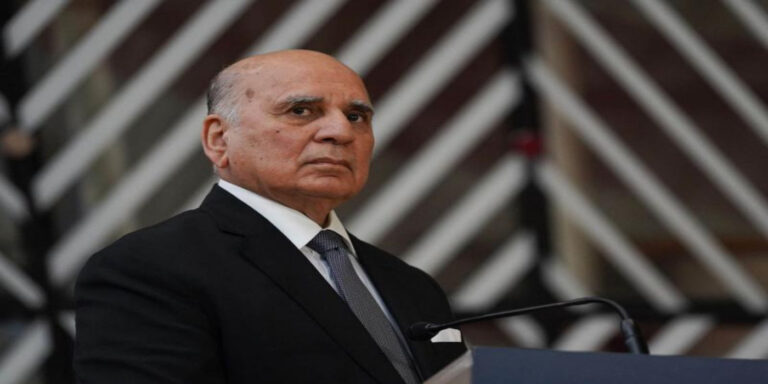Hussein met leading British businesses to identify new commercial opportunities.
Iraqi and British officials held a two-day strategic dialogue in London earlier this week, with Britain reiterating its commitment to supporting Baghdad in various sectors and the two sides agreeing to increase cooperation in the fields including security, economy and human rights .
Iraq’s Foreign Minister and Deputy Prime Minister Fuad Hussein on Monday headed an Iraqi delegation to London at the invitation from his British counterpart James Cleverly, meeting a number of the UK’s top officials.
Officials said the meetings in London during the UK-Iraq Strategic Dialogue this week reaffirmed the commitment of the two countries to work together and the two ministers agreed to develop and further cooperation on a wide range of sectors.
The Strategic Dialogue builds on the signing of the UK-Iraq Strategic Partnership in Baghdad in June 2021, which outlined UK’s commitment to the long-term security, stability and sovereignty of Iraq.
The meeting also followed the visit of the Minister of State for the Middle East and North Africa, Lord Ahmad, to Iraq, including the Kurdistan Region, earlier in the year.
Cleverly and Hussein discussed the importance of “building a prosperous future for the Iraqi people and the UK’s commitment to supporting Iraq, including through the Iraq Economic Contact Group, as it undertakes the bold long-term reforms needed to put Iraq’s economy and society on a stable footing,” a British government statement said.
Both sides welcomed the Iraqi government’s ambitious economic reform agenda and agreed on the necessity of rapidly delivering non-oil growth, private sector job creation and improving access to finance.
Iraq’s economy cannot thrive if the country’s security is not ensured, Hussein told British business leaders on Monday.
He said Iraq had come a long way since the Islamic State (ISIS) invasion of 2014 and was now secure but challenges linked to perceptions of the country and its reliance on fluctuating oil revenue remained.
“Investment needs security,” said Hussein at the Arab British Chamber of Commerce in London. “When there is security in Iraq, then we can talk about better economic ties.”
Challenges to economic reform
Among the challenges to Iraq’s economic reform plans, he said, was moving on from the “so-called socialist system” of previous governments, which had nationalised the oil sector and inflated the civil service.
“For 40 years, Iraq was very much centralised. It will be difficult to change this culture,” he said.
He added that a vicious circle had emerged, in which public sector jobs, running to a workforce of six million people, were hindering the growth of the private sector.
“The youth wants to be employed by the government because it guarantees them a job for the future, but also because of the weakness of the private sector,” he said.
The “culture of centralisation” was particularly entrenched in the oil industry, Hussein noted, adding that “the oil sector was like the military and intelligence services under Saddam.”
“It makes it difficult to create a new private economy.”
Iraq’s economy was shattered by the UN-led embargo of the 1990s and 40 years of conflicts, beginning with the Iran-Iraq war.
“War destroyed our infrastructure, I don’t just mean buildings and bridges, but our healthcare, education and agriculture,” the Iraqi top diplomat said.
“Our culture was replaced by the culture of war. For those who survived the war, the question is how they survived.”
Hussein outlined his hopes for Iraq’s democratic future. “We are on a good path,” he said.
Security and ‘regional stability’
Hussein also “spoke of Iraq’s role in the framework of promoting regional stability and bringing views close together between countries of the region, especially Saudi Arabia and Iran, and Iraq’s willingness to continue making efforts to decrease tensions in the region.”
Baghdad played a key role in the restoration of ties between Tehran and Riyadh in March, having hosted several rounds of talks aimed at reconciliation after the two countries severed their ties in 2016.
With bilateral trade between Iraq and the UK increasing, Hussein also met leading British businesses to identify new commercial opportunities, while both sides agreed their intention to finalise the UK-Iraq Partnership and Cooperation Agreement as soon as possible and put it to their respective parliaments this year.
On security, the UK and Iraq agreed on the importance of continuing to driving the Islamic State (ISIS) out of Iraqi territory. They welcomed the commitment of both the UK and Iraq to support the Global Coalition Against ISIS, as well as the efforts by both sides on rehabilitation and reintegration of displaced Iraqi citizens including those returning from Al-Hol camp in North-East Syria.
The UK has helped train the Kurdish Peshmerga during the war on ISIS and is part of a team of international allies working on major reforms of the Peshmerga ministry. There are up to 1,400 British personnel in both the Kurdistan Region and the rest of Iraq providing military assistance and advice to the Peshmerga and Iraqi security forces.
“Recognising modern threats posed by cyber, both sides agreed to deepen engagement on cyber security, including through the UK’s support of the newly-established Cyber Security Directorate within the Iraqi ministry of defence,” a British government communique said.
The two ministers discussed the shared challenges that the UK and Iraq face in tackling serious organised crime and the drivers of migration. They reviewed areas for further cooperation to ensure safe and legal migration, including targeted programming to better understand and address the drivers of illegal migration and establish robust and trusted processes for migration cooperation, including reintegration packages.
“The UK will bolster its support to strengthen Iraq’s borders through mutually agreed programmes,” the statement added.
Source : The Arab Weekly


